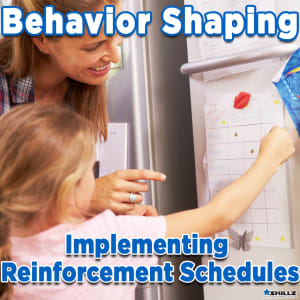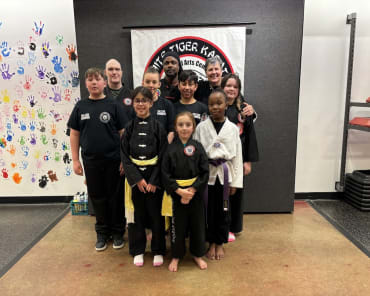
Behavior Shaping
Implementing Reinforcement Schedules
Getting children to behave how we want them to can be tricky. Even with the best intentions, parents often fall short regarding enforcing positive behaviors in their children while also extinguishing negative ones. Understanding reinforcement schedules and strategies for implementing them can be beneficial to parents and create positive behavior outcomes and improve the parent-child bond.
Looking at B.F. Skinner’s behavior theory regarding Operant Conditioning, we know that the most effective way to increase positive behaviors is by catching children being good and rewarding them for a job well done. This, coupled with ignoring negative behaviors, can be the most effective combination regarding behavior management. But to take this a step further, implementing positive reinforcement in the most effective way requires forethought and should include a planned out schedule, no matter what approach is chosen.
Believe it or not, children want to please their parents and other significant adults in their lives, but they also want to feel successful in their efforts. Implementing reinforcement schedules will establish both, but only when implemented correctly and with patience. Adults must understand that reinforcing good behavior and ignoring misbehavior is a long-term strategy that takes consistent efforts. Choosing a method of implementation, coupled with flexibility, can attain the best outcomes.
Various reinforcement schedules can be applied to improve positive behaviors and extinguish unwanted, negative actions.
1) Continuous: Reinforcement follows every time a wanted behavior occurs.
2) Intermittent: Reinforcement follows some, but not all, wanted behaviors.
3) Fixed Ratio: Reinforcement follows a behavior when it occurs a specified number of times.
4) Fixed Interval: Reinforcement follows a behavior within a fixed time interval with at least one wanted behavior occurring.
5) Variable Ratio: Reinforcement follows a behavior after an unpredictable number of times a behavior occurs.
6) Variable Interval: Reinforcement follows a behavior within an unpredictable amount of time with at least one wanted behavior occurring.
In parenting, if reinforcement is the primary strategy for behavior modification, parents often jump between different schedules. And while this may work for some children and
some behaviors, it may not work for others. Many factors play into the type of reinforcement schedule that will work best, including the child’s temperament, parenting style, mental challenges, and the specific behaviors that need to be reinforced or extinguished. Although continuous is the most effective for supporting wanted behaviors quickly, it can also cause those behaviors to stop when reinforcement stops. Switching to a variable ratio after an initial period of continuous reinforcement can create long term effectiveness for maintaining positive behaviors.
Incorporating any reinforcement schedule requires planning and patience. Parents must also be clear on the expectations of their children. Things such as “be good” do not give children any clarity of what they need to do or not do. When children understand why a specific behavior is good, they will be more motivated to succeed through effort and action. This approach ultimately lines up with the growth mindset theory. Additionally, using rewards that a child sees as valuable is vital.
The SKILLZ Child Development Centers utilize reinforcement for skill development and for shaping behavior. The Certified Pediatric Ninja Specialists who run each class create a supportive environment and build rapport with each student to be the most effective when implementing behavior modification strategies. The long-term approach of rewarding the development of new skills through extrinsic motivation while also fostering intrinsic motivation, leading to a growth mindset, sets the stage for each child's success now and in future endeavors.
When we approach each child and each behavior with consistency and patience, we can reinforce positive behaviors that improve a child’s behavior and the bond they have with adults.
A shout out to my mentor Jennifer Salama of Skillz Worldwide.
Jennifer is a 4th-degree black belt and has been training in martial arts since 2001. She has a Masters Degree in Child Psychology and has embraced the SKILLZ curriculum because of its focus on child development and using martial arts as a vehicle to develop the child as a whole.
To learn more about the powerful Skillz childhood development program at White Tiger Karate, that uses elements of martial arts training as the vehicle for growth, or to get your child started contact us at our location: 20 Canal Street Franklin, NH or call Sensei Sharyl Geisert at 603-998-9012.
Visit us as
https://www.facebook.com/whitetigerkaratellc
Parent support https://www.facebook.com/groups/801876003509594
Austism support https://www.facebook.com/groups/378261579434747
Ninjazone program https://www.facebook.com/Ninjazone-WTK-105231817669642
Skillz Worldwide https://www.skillzworldwide.com/





